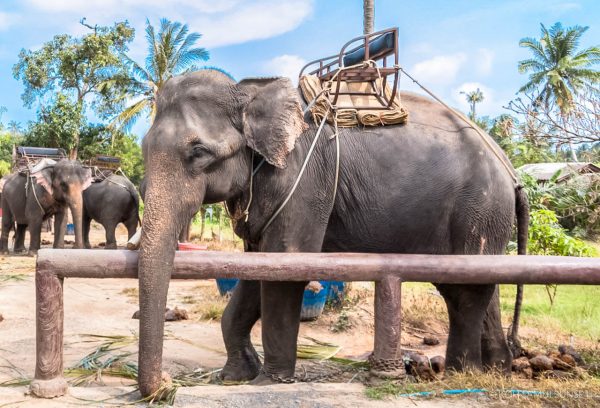BANGKOK, 2 August 2019: World Animal Protection is campaigning to end elephant rides worldwide in an e-letter campaign launched in July.
In this opinion feature presented by WAP, the agency praises ChangChill an elephant park in Thailand that has successfully ended elephant rides.
Formerly, Happy Elephant Valley, located in Chiang Mai, North Thailand, the project began its transition to a new ride-free business model in 2017.

World Animal Protection and some leading travel firms supported the transformation to a genuine elephant-friendly venue that as of this month has been rebranded ChangChill.
Having received 7,000 e-letters in support of its campaign, WAP highlights research conducted by University of Oxford’s Wildlife Conservation Research Unit to back efforts to end elephant rides.
The campaign delivers clear observations on the truth about elephant rides.
“Elephant rides are among the cruellest tourist activities because of the amount of suffering the elephants endure, physically and emotionally.
“In order for zoos and other attractions to allow people to get up close with elephants to pet, bathe or ride them, they must be cruelly trained to fear people and obey commands.
“Training methods vary across regions, methods typically involve social isolation, physical restraints, inflicting severe pain and withholding food and water.
“The elephant may look at peace, but this is because its spirit has been broken. The bullhook is used on thin areas of the elephant’s skin to cause pain and pressure; the elephants then learn to avoid it or face the consequences.
“The training is necessary if there is no barrier between the elephant and people (known as free contact management) because an elephant is dangerous and can seriously injure or kill people.
“The use of negative (and positive) reinforcement is needed to establish dominance to keep handlers and zoo visitors safe when close to an elephant.
“Many zoos are now moving to protected contact management of elephants where there are always barriers between the keepers, visitors and elephants.
“Elephants do suffer physically from giving rides. Elephants can’t bear weight as a horse can. They have long, thin, arched vertebrae, and rides can cause them injury like fractures to their spinal column.
“Animal cruelty is easily identifiable when physical abuse is witnessed. But the abuse elephants endure to be trained for rides and performances is hidden from the public.”
WAP concludes that Asian or African elephants would never let you near them in the wild, let alone ride on their backs. They must be trained to fear people in order to accept a human rider or to obey commands.
There are ethical, cruelty-free animal tourism opportunities. WAP reported that it recently helped ChangChill an elephant camp in Thailand to migrate from the business model of elephant rides to a completely elephant-friendly park.
It allows tourists to see elephants in a more natural habitat and observe them from a safe distance.
WAP lists some venues that it says are doing the right thing for elephants.
Thailand:
- ChangChill
- Boon Lott’s Elephant Sanctuary
- Burm and Emily’s Elephant Sanctuary
- Elephant Valley Thailand
- Global Vision International
- Mahouts Elephant Foundation
Cambodia:
Nepal:
Formerly known as WSPA (World Society for the Protection of Animals) the organisation is now called World Animal Protection.
It works closely with governments, the UN, businesses and other animal welfare organisations in Africa, North and Latin America, Asia Pacific and Europe.
Editor’s note: If you disagree with the opinions expressed by WAP, please post your views on this website. We welcome comments.
READ MORE:
LIST OF BEST PRACTICE ELEPHANT VENUES IN ASIA
(Source: World Animal Protection)
Disclaimer: This is an opinion presented by WAP and as such does not necessarily represent the views of this publication. However, we do believe that the travel industry and elephant parks need to reach an agreement based on relevant and independent research to ensure the way forward eliminates all forms of cruelty inflicted on domestic elephants in tourism.






